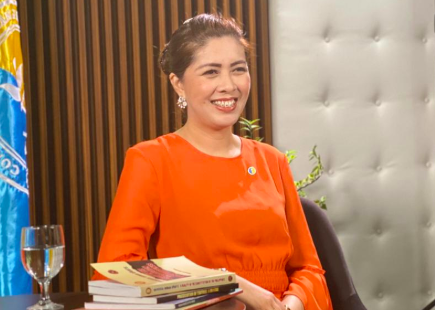
Commission on Human Rights spokesperson Atty. Jacqueline de Guia. Image from CHR
MANILA, Philippines — The Commission on Human Rights (CHR) has “reached out” to the Presidential Human Rights Committee (PHRC) in a bid to conduct dialogues with them for the impending United Nations (UN) review of the Philippines’ human rights pledges.
The UN Universal Periodic Review (UPR) of the Philippines’ human rights status is held every five years. It is set to be conducted sometime in October this year; it would be the first under the administration of President Ferdinand Marcos Jr.
CHR Executive Director Jacqueline de Guia revealed during a press briefing about the body’s own report for the UN rights review on Thursday that they have sent a letter to the PHRC, seeking a discussion on the UPR.
“Of course, we want to make sure that our recommendations are heard, and that’s the primary purpose of today’s press conference, to popularize the issues and concerns surfaced by civil society and by the CHR. We continue also to open the lines of communications with [the] government and engage with them further,” de Guia, who is acting as CHR’s caretaker in the absence of a chairperson, told reporters.
“That is the reason why we at CHR through our Human Rights Policy Office has reached out to the Presidential Human Rights Committee in recent days to make sure that we are also able to provide them our recommendations with regards the upcoming UPR,” she added.
De Guia said their letter contains requests for a consultation, that CHR be included in the process of making a report ahead of the UPR.
The government of a country being reviewed by the UN is required to submit its report on human rights. But the CHR will also submit its own version that includes inputs from civil society organizations – which observers utilize to countercheck the government’s claims.
The acting CHR head said they asked the PHRC if they could comment on the report, and if they could also listen to grassroots organization before crafting the report.
“In that letter, we highlighted the need for genuine consultation, we asked that we be made part of the process that if we can also have copies of their reports, and if we can be also asked to comment on those reports to enrich the discussions of course on the human rights issues, if they can also extend a listening ear to civil society and engage them also in meetings,” de Guia explained.
“We have the UNJP program right now, and one of the key thrusts of the program is to make sure there is continuous engagement with civil society and they are given opportunity to be heard, and I hope that through the UPR process we’re able to continue the discourse of human rights,” she added.
De Guia admitted that they are cautiously optimistic about the current administration, noting that while the review is not about the incumbent government, it would reflect a lot about their stand on human rights.
“Of course we remain cautiously optimistic with this new administration, we must take into consideration that the UPR review is a flashback, is a review of the past five years and therefore does not necessarily reflect the current administration,” she said.
“However, the challenge remains for the incumbent administration to act upon those issues and concerns, and make sure that they are able to convey an image and more importantly action, concrete action on the ground that will illustrate human rights protection and promotion,” she noted.
Since assuming the presidency, Marcos Jr.’s administration has not clearly expressed its human rights policy as it was not even mentioned in his first State of the Nation Address in July. However, stakeholders have been optimistic despite his family’s history, as he assured UN Resident Coordinator in the Philippines Gustavo Gonzalez of his commitment to human rights.
READ: Bongbong Marcos commits to human rights accountability, says UN envoy
It is also not clear what Marcos Jr.’s plans are for the CHR, which is still without some commissioners and a chairperson.
CHR’s commissioners have taken turns doing leadership and caretaker roles since October 2021, after the untimely death of former chair Chito Gascon due to COVID-19. But most of CHR commissioners have already ended their seven-year terms, creating a gap within the constitutional body.
READ: CHR still ‘headless’ but far from going blind
De Guia said during the same briefing that they completely have no idea as to who might get appointed to the CHR’s sixth en banc.